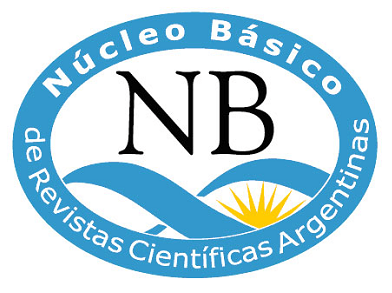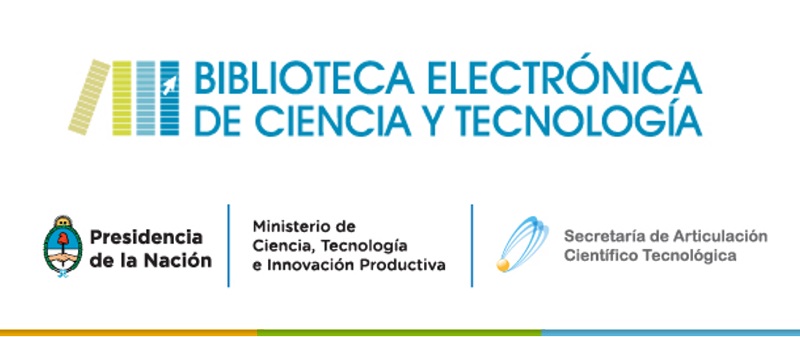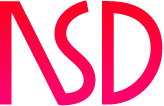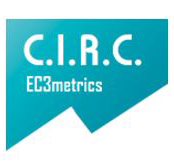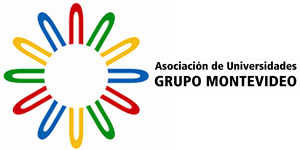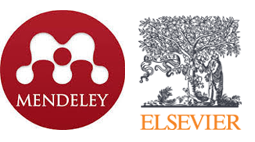About the Journal
+E is a semi-annual publication of the Secretary of Extension and Culture of the UNL. +E is a space for theoretical-methodological discussion on university extension policies and actions implemented in Latin America and the Caribbean. Based on a central theme that is renewed annually, the academic community, together with local governments and civil society organizations that work on extension projects, can submit their writings in the sections owned by the magazine. +E is indexed and published in two languages: spanish and portuguese.
+E is part of the diamond open access policies: it does not charge fees to authors for publishing or to readers for accessing content.
ISSN 2346-9986 (versión en línea)
ISSN 2250-4591 (versión impresa)
Año de Inicio: 2011
Periodicidad: Semestral
Idioma: spanish, portuguese and english.
Main themes: University extension policies and actions. Theoretical perspectives linked to the social construction of knowledge and comprehensive university education.
Information for authors
1. SCOPE OF THE JOURNAL
+E intends to constitute a space for debate on the policies and theoretical foundations that fertilize the field of university extension carried out in the Latin American and Caribbean university system. Each year, a topic is convened that deals with a management strategy or a problematic field of university extension. This theme makes up two issues per year in the digital version. Downloading the articles is free and free.
+E is part of the open access policy.
+E is aimed at researchers, professors, university students and management personnel, as well as members of public agencies and civil society involved in university extension practices.
2. CONDITIONS
Articles submitted to +E must be original and unpublished, and cannot have been proposed simultaneously to other journals.
3. THEMES AND SECTIONS
+E Journal receives articles based on the central theme that the Editorial Board makes official each year. Calls are public and open.
The chosen themes are directly related to the political, theoretical and methodological lines linked to the function of university extension.
Articles can be submitted in the following sections:
- Perspectives
- Panoramas of current theoretical, methodological or political discussions on concepts or categories of the call's central theme. References to contributions by certain authors or schools of thought that challenge the university's social mission.
- Historical paths or comparative studies that make it possible to account for a “state of situation” in a given country, region or institution in relation to processes and social actors linked to the central theme.
- Critical approaches based on a case study that allow the discussion of theoretical, conceptual and methodological approaches in relation to the central theme.
- Analysis of the role of higher education institutions, public policies and the social impact of the central theme.
- Management challenges
- University management strategies in relation to the central theme of the call. The approaches, conflicts, challenges and limitations in the design and implementation of university policies on the theme addressed by the journal must be exposed. Experiences must be advanced.
- Surveys that focus on the management lines themselves.
- Interventions
It includes work resulting from projects or university extension programs that have already been concluded or that have made significant progress, in the general lines on which the public notice is based. In all cases, they must present the theoretical perspectives from which the project is approached (both the extension approaches and the theme it addresses), the situation prior to the intervention and a critical analysis of the processes and results (involving university students and not - university actors).
- Book review
Aims to present and/or criticize current books and refer to their theoretical-methodological contribution to the proposed central theme.
4. GUIDELINES FOR THE SUBMISSION OF ARTICLES
Guidelines for authors
5. SCIENTIFIC ARBITRATION PROCESS OF ARTICLES
Firstly, the articles are evaluated by the Editorial Board according to their pertinence to the proposed theme. The Board can directly reject the works received without resorting to an external consultation process if it considers them inappropriate for the journal because they lack the required level of quality, because they do not respond to the theme of the call; for lack of adequacy to the standards established by the journal or for presenting evidence of fraud.
Once this instance is overcome, the articles are submitted for consideration by the Scientific Arbitration Committee, formed especially for the theme and are evaluated under the “double blind” system, this presupposes that the evaluators will not know the author's name and vice versa. Reviewers will not be affiliated with the same institution from which the article originated.
The final result of the opinion could be:
- Approved, without any objections. In this case, it will be submitted to style correction for its final disposition in the journal.
- Approved, subject to modifications regarding the writing or bibliography, requests for clarification or observations that the reviewers consider pertinent. In this case, a certain amount of time will be given to the authors for their correction. After the deadline, if the authors do not make the necessary corrections or allegations, the article will not be published in that edition. If the authors make the necessary changes, the article returns the correction. Once the final version has been approved, it goes on to style correction and is published. If the reviewers consider that the changes were not made, the article will not be published. This definition is unappealable.
- Failed when it does not meet the minimum standards (in terms of theoretical soundness or has severe deficiencies in writing). In this case, the article will not be published in that issue. The judgment of the reviewers is unappealable.
In case of divergent opinions among the evaluators, the Editorial Board will review them and make a decision about them. The decision will be unappealable.
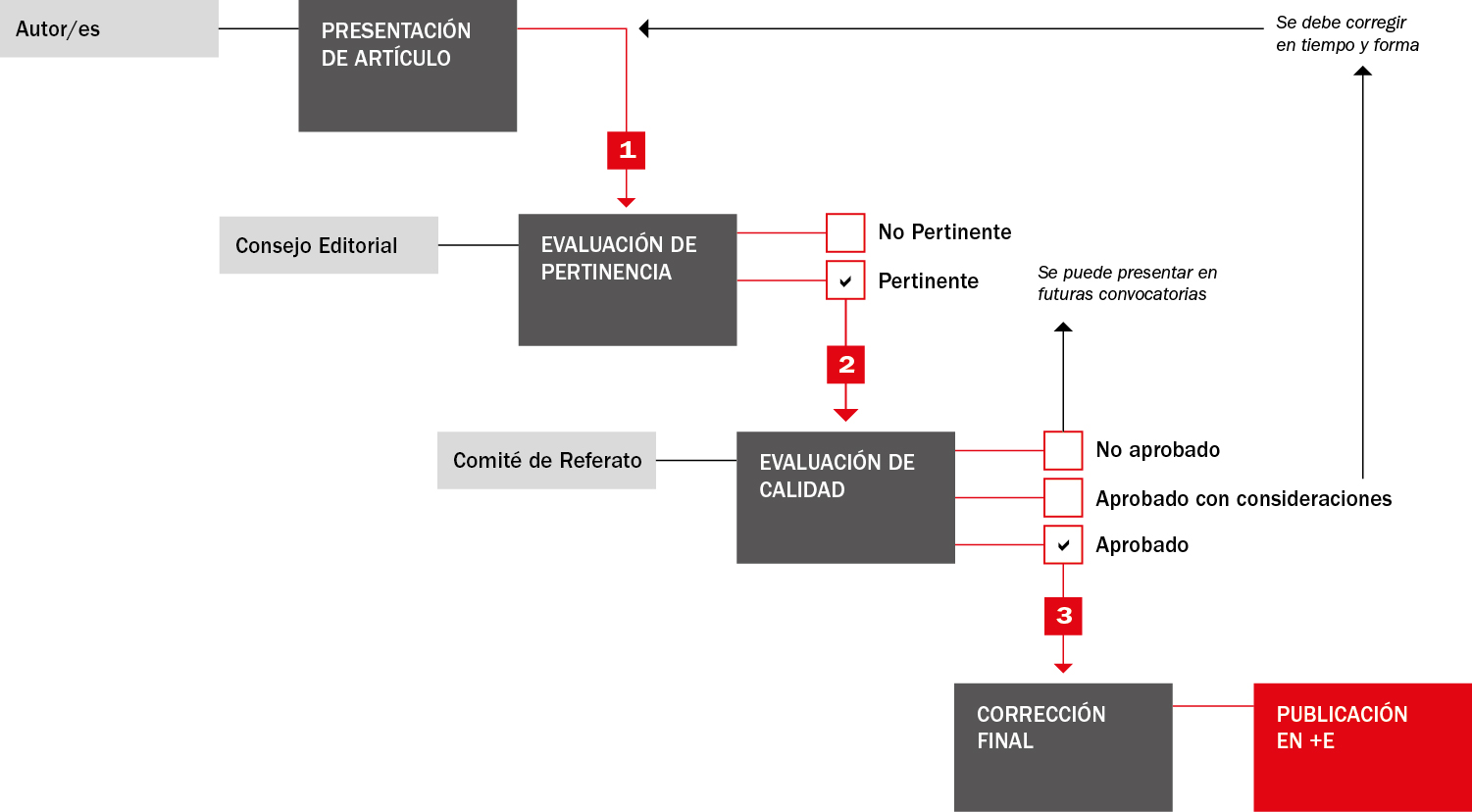
The reviewers will pay attention both to the formal presentation of the writing (clarity and precision in the writing of the article; structuring of the work and adequacy of the bibliographic references) and to the quality of the content (expository coherence; analysis and adequate justification; rigor and conceptual precision, logic of presentation of the content, contributions to university extension and relevance and current bibliography). Authors can download the review criteria for consultation by going to Publish in +E.
The selected articles will be available in digital version, according to the Editorial Board.
+E is not responsible for unpublished works.
6. EVALUATION AND NOTIFICATION
The evaluation process will take place throughout the year, due to the end of each period established in the notice. The review process for each article takes an average of 3 months.
The notification to the authors of the articles will be made in two periods: June and December.
7. PERIODICITY OF PUBLICATION
Journal +E is published every six months, in July and December.
8. INTELLECTUAL PROPERTY
Authors who publish in +E maintain their copyright and guarantee the journal the right to be the first publication of their work. The manuscript is protected by a Creative Commons Attribution-NonCommercial 4.0.

This License implies that it is possible to copy, communicate and publicly distribute its contents provided that the individual authors and name of this publication, as well as the publishing institution, are cited. The content of this Jorunal cannot be used for commercial purposes. The complete license can be consulted here.
Authors may separately establish additional agreements for the non-exclusive distribution of the version of the work published in +E, with acknowledgment of the original publication in our journal.
Authors are allowed and encouraged to mention their work on other sites, for example, on institutional or personal pages, thematic or institutional repositories, social networks, etc., mentioning the persistent identifier (DOI) of the article after publication in our journal, as it can lead to productive exchanges and a wider and more rapid dissemination of published works.
Policies
1. OPEN ACCESS POLICIES
The articles published in +E are freely available in the Virtual Library of Periodical Publications of the Universidad Nacional del Litoral.
The magazine +E adheres to the definition of "open access" of the Budapest Open Access Initiative (BOAI).
+E sustains its commitment to the policies of Open Access to scientific information, considering that both scientific publications and research sponsored by public funds must circulate freely and unrestrictedly on the Internet.
No expenses or fees are charged for publishing articles. Journal +E ratifies the Open Access model in which the contents of scientific publications are made available in full text free of charge on the Internet, without time constraints, and whose editorial production costs are not transferred to the authors. This policy proposes to break down economic barriers that generate inequities both in access to information and in the publication of practical extensionist research results that pursue or fit the journal's editorial standards.
2. ETHICAL PRINCIPLES
The journal +E adheres to the national and international codes of ethics, the document CONICET: Guidelines for ethical behavior in the Social Sciences and Humanities (Resolution No. 2857, December 11, 2006) as well as the document Guide lines on Good Publication Practice (Committee on Publications Ethics: COPE ). Emphasis is placed on the following issues:
- The Editorial Board is committed to providing clear information on the entire editorial process: the evaluation of relevance, the results of the peer review and the criteria used in it. Along with this, they must, at all times, make known the instances in which the received papers are found for their consideration to be published to +E.
- Privacy statement: At no time will the Editorial Board disclose the identity of potential authors, reviewers or evaluators, as well as any data arising from an article sent to +E, prior to its publication. Similarly, it will not disseminate any information regarding the content of articles that have not been selected for publication.
The Editorial Board has the power to decide on what is published in +E, evaluating the originality and importance for university extension in general. Likewise, and if necessary, the Editorial Board may make corrections, clarifications and apologies.
It is expressly established that the opinions of the authors are their sole responsibility. - Obligations: The author or authors are responsible for ensuring that the submission has not been previously published nor has it been simultaneously sent to another journal (or an explanation has been provided in Comments to the editor).
The author or authors must verify that the text meets the bibliographic and style requirements indicated in the Guidelines for authors, which can be found in About the journal.
The author or authors must corroborate that the work sent for evaluation complies with the ethical standards established for the Social and Human Sciences.The reviewers must communicate about the possible plagiarism detected in the works they evaluate.
Likewise, they must maintain confidentiality about the articles reviewed.
In case of rejecting a work this must be substantiated by the reviewers.Reviewers should excuse themselves in case of conflicts of interest.
3. DIGITAL PRESERVATION POLICY
The information present in the "System of Periodic Publications" (SPP), is preserved in different digital supports daily and weekly. The media used for the "backup copy" are hard drives and magnetic tapes.
- Hard disk backup: Two disks configured with a RAID 1 scheme are used. Another backup is made to a remote backup server that is in a different physical location from where the main SPP server is located. This copy is made every 12 hours, without compression and / or encryption.
There are two schemes for backup copies on magnetic tape: daily and weekly backup copies.
- Daily backup copy on magnetic tape: every 24 hours a total backup copy of the SPP is made. For this process there are a total of 18 different magnetic tapes in a rotating scheme. One magnetic tape is used per day, and the magnetic tape with the oldest backup copy is overwritten. Gives a total back-up time of up to 25 days back.
- Weekly backup copy on magnetic tape: every week (every Saturday) another complete backup copy is made on magnetic tape. For this, there are 10 magnetic tapes in a rotating scheme. Each new backup copy is made on the magnetic tape containing the oldest copy, which gives a total backup time of up to 64 days back.
The files on magnetic tape are stored in zip format and are compressed by the backup management system. In the event of a possible failure of the equipment for reading / writing magnetic tapes, two reading-and-recording equipment is used that can be interchanged.
The magnetic tapes of the daily and weekly backup copies are kept inside a fireproof container (safe). Database backup copy: Applies a daily backup copy (dump) of the system database and a backup copy of the complete database engine with the ability to recover from failures of up to 5 minutes prior to the fall. Additionally, the database server is replicated on two nodes that have RAID 1.
4. POLICY REGARDING PLAGIARISM
The assumptions of plagiarism are: present the work of others as your own; adopt words or ideas of other authors without due recognition; do not use quotation marks in a literal quote; giving incorrect information about the true source of a quote; paraphrasing a source without mentioning the source; abusive paraphrasing, even if the source is mentioned.The general cases of scientific fraud are the following: a) fabrication, falsification or omission of data and plagiarism; b) duplicate publication; and c) authorship conflicts. Dishonest practices related to plagiarism and the various cases of scientific fraud that are detected will be debated by the members of the Editorial Board, who will decide the measures to be adopted. The author / s will assume the consequences of any kind arising from the breach of the obligations indicated in these editorial rules.
All articles sent to +E will be reviewed using the Plagius detection software
In order to deal with cases in which plagiarism is incurred, the Editorial Board will follow the following procedures:
- Evidence of the plagiarism detected will be sent to the author, requesting an explanation about it.
- If the answer is not satisfactory for the Editorial Board, the article will not be subjected to external evaluation and the journal will not receive any more articles from the authors. In turn, if applicable, the media in which the plagiarized original article was published will be informed.
- No more works will be accepted from the authors to the magazine +E
Indexing and Declarations
SciELO: Scientific Electronic Library Online
Redalyc: Sistema de Información Científica Redalyc link
Núcleo Básico: Núcleo Básico de Revistas Científicas Argentinas de CONICET con sede el CAICYT link
Erih Plus: Índice de referencia europeo para las Humanidades y las Ciencias Sociales link
Latindex 2.0: Directorio, catálogo y enlace a revistas electrónicas link
CAPES: Portal de revistas CAPES/MEC link
CIT: Centro de Información Tecnológica link
DATABASE
CONICET Digital: Repositorio institucional del CONICET link.
BIBLIOTECA DEL MINCYT: Biblioteca Electrónica de Ciencia y Tecnología link.
DIALNET: Portal bibliográfico de literatura científica hispana link
IRESIE: Base de datos sobre Educación - IISUE, UNAM
MIAR: Matriz de Información para el Análisis de Revistas link
SNRD: Sistema Nacional de Repositorios Digitales link
SIUBDU2: Base de Datos Unificada, cosechador de repositorios institucionales desarrollado por el Consorcio de Universidades SIU dependiente del Ministerio de Educación de la Nación link
JournalTOCs: Colección de tablas de contenido de revistas científicas link
NSD: Centro noruego de datos de investigación link
CORE: colección de artículos de investigación de acceso abierto link
DIRECTORIES
ROAD: Directorio de Recursos Académicos de Acceso Abierto link
DOAJ: Directorio de Revistas de Acceso Abierto link
Biblat: Biliografía Latinoamericana (UNAM, México) link
REDIB: Red Iberoamericana de Innovación y Conocimiento Científico link
CLASE: Citas Latinoamericanas en Ciencias Sociales y Humanidades link
BINPAR: Bibliografía Nacional de Publicaciones Periódicas Registradas link
ResearcH Journals & Authors: Directorio de revistas científicas link
LatAmPlus: Colección digital de revistas arbitradas link
CIRC: Clasifcación Integrada de Revistas Científicas link
NETWORKS AND PORTALS
REDREU: Red de Editores de Revistas de Extensión Universitaria de AUGM link
AURA: Espacio sobre las revistas científicas en cuanto a las políticas de apertura y derechos de explotación de la publicación científica link
DORA: Declaración de San Francisco Sobre la Evaluación de la Investigación link
LatinRev: Red Latinoamericana de Revistas Académicas en Ciencias Sociales y Humanidades. FLACSO link
Malena: Políticas de jerarquización, acceso y archivo de las publicaciones científicas argentinas link
RedSara: Red nacional de portales de revistas científicas (Argentina) link
Declaraciones
+E subscribe:
- Declaración de San Francisco sobre la Evaluación de la Investigación (DORA)
+E was declared of interest by:
- Red Nacional de Extensión Universitaria (Consejo Interuniversitario Nacional - REXUNI).
- Comisión Permanente de Extensión de la Asociación de Universidades del Grupo Montevideo (AUGM).
- Unión Latinoamericana de Extensión Universitaria (ULEU).
- Secretaría de Políticas Universitarias. Ministerio de Educación, Cultura, Ciencia y Tecnología
- Pró-Rectoria de Extensión de la Universidade Federal do Rio Grande do Sul, Brasil
- Área de Promoción de la Extensión y las Actividades en el Medio del Servicio Central de Extensión y Actividades en el Medio de la Universidad de la República, Uruguay.
- Grupo de Estudios en Políticas y Prácticas Educativas del Instituto de Educación de la Facultad de Humanidades y Ciencias de la Educación de la Universidad de la República, Uruguay.
- Grupo de Investigación Geografía, Acción y Territorio (GIGAT) de CLACSO y Universidad Nacional de la Patagonia San Juan Bosco, Argentina.
- Centro Interdisciplinario de Estudios Avanzados (CIEA) de la Universidad Nacional Tres de Febrero. Argentina.
- Cátedra Unesco Educación Superior y Pueblos Indígenas y Afrodescendientes en América Latina, Argentina.
- Observatorio de Participación Social y Territorio de la Universidad de Playa Ancha, Chile
- Departamento de Economía y Administración de la Universidad Nacional de Quilmes, Argentina
References
- Google Académico link
- Mendeley: gestor de referencias de datos y estadísticas. Servicio proporcionado por Elservier link
- CrossRef: Metadata Enables Connections strong link
Contact
Responsible editor
Cecilia Iucci
Email
revistaextensionunl@gmail.com
Facebook
Revista de Extensión Universitaria UNL
WEB
https://www.unl.edu.ar/extension/revista-de-extension/
Telephone
+54 (0342) 4575136 int. 114.
Administrative address
San Jerónimo 3231


